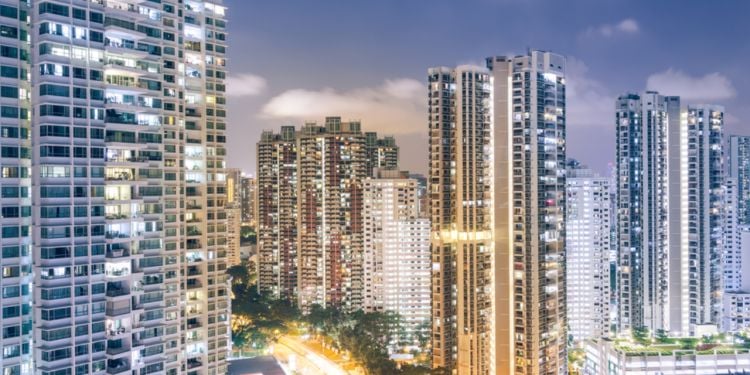
Expats interested in moving to Singapore should be well aware of the fact that the country has a high cost of living, and this is especially true for housing. However, the country offers a wide range of options, from single houses to condos or flats. Singapore also has an efficient public transport system, so do consider venturing beyond the most sought-after locations.
Where to live in Singapore
Some of the most favored locations for foreigners include central locations such as Orchard Road and Tanglin. These places buzz with activity and are ideal if you want to be close to shops and an eclectic set of hawker centers, which are eateries offering a wide selection of foods. Flats in these areas tend to be more expensive, as are housing options in Sentosa Cove, which is an exquisite enclave located towards the Eastern part of Sentosa Island.
More affordable accommodation options in Singapore can be found in Serangoon Gardens, as well as in some areas of Holland Village, which is located in a convenient area with bars, shopping centers, and laidback cafés. Other nice areas to consider include Tiong Bahru, Tanjong Pagar, and the Woodlands. Tiong Bahru can be a great place for young singles and couples, as it's being quickly gentrified and has lots of cool coffee shops and branded stores. As a general rule, prices tend to drop the further away you go from central Singapore, especially in the Central Business District (CBD).
Accommodation for families
If you've got children, then you'll want to choose housing that's close to your kids' schools, so this will depend on which schools you'll send them to.
If they're attending the Singapore American School, then you'll want to stick to Woodlands. This area is full of American expats. However, if they're attending United World College, you should pick the West Coast. If your kids are at the UWC East Coast campus, then a property on the East Coast is acceptable as well.
Types of accommodation in Singapore
Thankfully, there are several accommodation options when living in Singapore, whether they're short or long-term solutions. Let's take a look at what they are.
Airbnb
Unfortunately, if you're looking for Airbnb or anything similar, these are illegal in Singapore. For all rentals, there's a minimum stay of 3 months. For HDB apartments (more on this later), the minimum stay is 6 months.
Not all hope is lost, though. You can always rent out a hotel room for a few weeks, although this can get expensive. You can also look into getting a rental with the Serviced Apartments Association. This is also expensive but offers a short-term solution while you look for your new home.
Expect to pay between S$4,000 and S$10,000, depending on where the property is located and how luxurious it is.
Room in a property
The cheapest long-term housing solution is to rent a room in a property with other people. While you'll lose out on privacy, you'll save a bunch on expenses, as you'll have more money to put towards other things.
Renting a room is also more flexible, as you'll be able to find vacancies in private condos, houses, apartments, and HDB apartments.
Expect to pay around S$650 per month if you manage to get a room out of the central area. Otherwise, rent can be as high as S$2,000 for a room in a nicer and more convenient location with lots of amenities.
HDB apartments
A popular option, especially for cash-strapped students, is the Housing and Development Board (HDB) apartments. Although the original aim of HDB housing was to cater to the poorer strata of the Singaporean population, the quality of housing has increased in recent years, and HDBs are definitely worth visiting on your house-hunting trips. There are restrictions, however, on the attribution of HDB apartments, and only permanent residents, student pass holders, or long-term social visit pass holders can submit applications. So, if you're in Singapore on a work pass, you won't be able to apply for HDB apartments.
You can expect a three-bedroom HDB apartment on the outskirts of town to cost around S$3,500 per month. This means if you're looking for something smaller, it'll be a lot more affordable.
Condominiums
Condominiums are also immensely popular in Singapore. You can either rent them from private landlords or through real estate companies.
Of course, condos in Singapore can come in different sizes and shapes, as well as locations. They generally come equipped with swimming pools, gym facilities, and, in some cases, tennis courts.
Because they typically come with great amenities, condos will surprisingly be more expensive than renting out houses in some cases. However, it's up to you to decide if the amenities are worth paying extra for rather than just saving money on a house with no access to these things.
As you might've expected, rent prices for condos will vary drastically. For example, if you rent out an older one-bedroom condo, it can cost around S$3,200 a month, which isn't bad. A fancier two-bedroom apartment in a popular area with generous amenities can cost over S$11,000 a month.
Cluster houses
A step above condos are cluster houses. While it's a private house you can live in, the facilities are communal, which means you have to share them with other cluster houses. These houses can either be detached or joined. This can be a good option if you don't want to live in an apartment but can't manage to live in a private house on your own.
Of course, rent will be differently priced, depending on how big the cluster houses are and where they're located. For example, expect to pay around S$8,000 for a four-bedroom cluster house in Seletar, which is out of town. On the other hand, if you live in Bukit Timah, the same-sized cluster house will cost you over S$11,000.
Black and Whites
Even though apartments are the most popular form of accommodation, Singapore also offers an excellent choice of houses to choose from, although these tend to cost significantly more.
Among the most popular type of houses are the so-called “Black and Whites”. These are homes built during the colonial era to house British military men and their families. They're characterized by white walls and black trim and are part of Singapore's historical legacy. They're generally owned by the Singaporean government and are in high demand, especially by expatriates. Most of the Black and Whites come with large gardens, which are a real treasure in land-scarce Singapore.
Do note that there are only around 500 of these properties in the nation. You'll have to rent one through a closed auction with the Singapore Land Authority (SLA). Not only will you get to enjoy living in a piece of history, but rent prices are amazingly low as well. However, this is set to change with the nation's redevelopment plans, and in fact, some Black and White residents have already received steep rent increases.
Bungalows
You'll find both regular bungalows and good glass ones in Singapore. Regular bungalows are typically older landed houses that thankfully have air conditioning installed. They're nice and open, as well as spacious, which allows you to truly enjoy tropical living.
The main difference between regular and good-class bungalows is that the latter offers more amenities. More specifically, you'll get a large garden and even a pool.
What's surprising is that often, you'll find large bungalows are cheaper than smaller ones. This is because the larger properties are usually older, so you'll sacrifice some quality for quantity instead.
You can expect to pay S$5,000 a month for a three-bedroom bungalow that's on the West Coast. Otherwise, in a better area, a 5-bedroom good-class bungalow can cost S$25,000 per month. Do note that you'll also need to factor in extra costs to maintain the property, such as getting pool maintenance and hiring a gardener to perform regular landscaping.
Heritage homes
Heritage homes (also known as conservation homes) are properties that hold historical value and have been restored, and are protected by the Urban Redevelopment Authority (URA). You'll have two choices here: shophouses or Black and Whites (which we already discussed earlier).
Shophouses can be a quirky way to experience Singapore, as these are rows of terraced houses that are each colored differently. The good news is, while the outsides of these houses are preserved, the insides have been modernized for maximum comfort. However, there's no outdoor space, and you're close to all your neighbors, which can feel claustrophobic at times.
You can expect to pay between S$6,000 to S$8,000 a month to rent a shophouse.
How to find accommodation in Singapore
In most countries, you can take a walk down the street, and you'll see many “for rent” signs, but this won't be the case in Singapore. If you tried to do this, you might think there aren't any properties available! Sometimes, you'll get lucky and see a banner with a real estate agent's contact information on it, but in most cases, there won't be any indication that a property is available for rent.
Your best bet is to use the internet to find places to rent. There are several real estate websites you can use, such as SRX Property, Mogul SG, iProperty, and 99.co. You can also browse Craigslist or even expat groups on Facebook to see if anyone has any leads.
You can also work with a Singaporean real estate agent. What's interesting to note here is that in this country, real estate agents can't work with both the landlord and the renter; it's illegal. This means when you hire a real estate agent, you can trust that they have your best interests at heart. They must also be registered by the Council for Estate Agencies (CEA), so check the public register to see if the agent you've hired is properly licensed and registered. If you manage to rent a property, then the real estate agent gets a commission, of course. However, the good news is you're not responsible for it, as the landlord will typically take one month's rent and split it between the two agents for commission.
Of course, you can also ask your family and friends if they've got any connections, especially if they're Singaporean or know someone who is. You never know if someone's ready to rent out property and doesn't want to go through the trouble of listing it. You just might find a direct connection to housing before you even step foot in Singapore!
The paperwork to secure a property in Singapore
If you're interested in a property in Singapore and the landlord accepts your offer, then you'll receive a letter of intent (LOI) from them. Before you sign it, you should do a walkthrough of the property; do this with your real estate agent if you have one. This is your chance to not only get the property fixed up but also to negotiate the conditions of your lease. It's common practice to negotiate prior to signing a lease, and you're highly encouraged to include specific amenities or services you feel are missing (e.g., cleaning) and to negotiate down the price you're asked to pay for the housing.
Lease agreements in Singapore generally last 2 years. Some of the leases contain clauses that allow the holders to break the lease more easily should they have to leave Singapore earlier than expected (diplomatic lease). This allows the termination notice to be reduced to 1 or 2 months and is an essential component of any lease you sign, especially if you're uncertain about how long you'll be in Singapore.
After signing the LOI, you'll have to submit a good faith deposit (usually one or two months' rent). This will go on to become all or part of your security deposit if you go through with the process. Next is signing the tenancy agreement.
There are many real estate agencies in Singapore, and it's advisable to contact a few to get an idea of the prices. It's also worthwhile to contact private owners since agencies generally apply a steep service charge. It's highly advisable to visit a few properties prior to making a final choice.
Useful links:
We do our best to provide accurate and up to date information. However, if you have noticed any inaccuracies in this article, please let us know in the comments section below.








